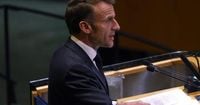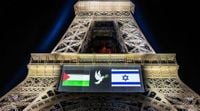On September 22, 2025, the diplomatic landscape surrounding the Israel-Palestine conflict shifted, at least symbolically, as a wave of Western nations announced their formal recognition of a Palestinian state at the annual United Nations General Assembly in New York. France and the United Kingdom, two of the world’s most influential powers, made headlines by joining a growing list of countries—including Australia, Belgium, Canada, and Portugal—in officially acknowledging Palestinian statehood. The move, hailed by its proponents as a "strong symbolic act," was intended to ramp up international pressure on Israel and revive momentum toward a two-state solution. Yet, as history and recent events suggest, the tangible impact of such recognition remains uncertain at best.
This latest round of recognitions follows a pattern set in motion over a decade ago. According to GIS Reports, Sweden became the first Western European nation to recognize Palestine in 2014, but the gesture did little to alter the dynamics on the ground. Swedish diplomats, for example, continue to operate from Jerusalem rather than the West Bank, relying on Israel for security and accreditation. Fast forward to 2024 and 2025, and the list of European countries recognizing Palestine has expanded to include Spain, Norway, Slovenia, Ireland, and, most recently, the UK and France. Andorra, Monaco, Luxembourg, Malta, and Belgium have also joined the chorus, as reported by Haaretz and GIS Reports.
The announcement in New York was not without its immediate repercussions. As GIS Reports notes, the day France announced its recognition, Hamas "walked away from the negotiating table," raising their demands and halting ceasefire talks. Meanwhile, the Israeli government responded by approving new settlements in the sensitive E-1 corridor of the West Bank and briefly floated the possibility of annexing further territory—a plan reportedly shelved only after the United Arab Emirates issued a stern warning about reassessing bilateral relations.
The symbolic weight of these recognitions is not lost on the international community. With France and the UK joining China and Russia—who recognized Palestine back in 1988—in acknowledging Palestinian statehood, four out of five permanent members of the UN Security Council now officially support the cause. The United States, increasingly isolated on this issue, stands alone in its opposition. The theory, as articulated by supporters and cited by GIS Reports, is that as more nations recognize Palestine, Israel and its allies may eventually face embargoes and sanctions, compelling them to make concessions at the negotiating table. Yet, as past experience shows, such symbolic pressure rarely translates into concrete policy changes or peace on the ground.
Indeed, the potential negative consequences of these recognitions are front and center in the analysis by GIS Reports. First, there is the risk of emboldening extremists on both sides. For Hamas, international recognition is touted as a diplomatic victory, encouraging further intransigence and resistance to ceasefire offers. For hardliners within the Israeli government, the recognition serves as a pretext to expand settlement activity or even consider annexation. As U.S. Secretary of State Marco Rubio observed, "The day the French announced their thing… Hamas walked away from the negotiating table. They immediately increased their demands and stopped negotiating." The cycle of provocation and retaliation appears unbroken.
Second, there is the specter of Israeli retaliation against the recognizing states. While unnamed Israeli officials have hinted at the possibility of withholding intelligence sharing—a move that could have serious counterterrorism implications for countries like Australia, Belgium, and Canada—such a step seems unlikely. As GIS Reports points out, intelligence sharing is a two-way street, benefiting Israel as much as its partners. For example, Israeli intelligence reportedly played a key role in Australia’s recent decision to shutter the Iranian embassy and designate the Islamic Revolutionary Guard Corps as a terrorist group.
The third, and perhaps most enduring, consequence is the potential erosion of credibility for the countries making these announcements. Hosting high-profile international conferences and issuing foreign policy proclamations that are widely perceived as lacking substance can, over time, undermine a nation’s standing among both allies and adversaries. France and Saudi Arabia’s co-hosted conference in New York on September 22, aimed at promoting a two-state solution, was scheduled on the eve of Rosh Hashanah, effectively excluding Jewish and Israeli participation—a detail not lost on observers.
So why do these countries persist in recognizing Palestine, despite the limited practical impact and potential backlash? The answer, as GIS Reports suggests, is rooted in domestic politics. In Britain, Canada, and Australia, center-left governments face mounting pressure from pro-Palestinian advocacy groups and progressive factions within their coalitions. In France and Belgium, where Muslim communities make up a significant portion of the population, support for Palestinian statehood is a potent political issue. Media coverage of the humanitarian crisis in Gaza further amplifies the urgency of these gestures, even if their real-world effects remain elusive.
In contrast, some nations have opted for a more pragmatic approach. The United Arab Emirates, for instance, has maintained strong diplomatic, trade, and military ties with Israel since the Abraham Accords, using its influence to dissuade Israel from taking provocative actions such as annexation. Germany, too, wields leverage through its role as a key supplier of military equipment to Israel, a position that has prompted Israeli leaders to heed Berlin’s concerns about the conduct of the war in Gaza.
Meanwhile, the geopolitical chessboard continues to evolve. On September 23, U.S. President Donald Trump is set to present a proposal to Arab and Muslim leaders—including Saudi Arabia, the UAE, Qatar, Egypt, Jordan, Turkey, Indonesia, and Pakistan—aimed at achieving peace and post-war governance in Gaza. According to Axios, the plan will address the release of hostages, an end to the war, an Israeli withdrawal from Gaza, and the establishment of a local administration without Hamas involvement. The U.S. is also seeking Arab and Muslim military involvement in Gaza to facilitate Israel’s exit and secure funding for reconstruction.
As the dust settles on this latest round of diplomatic maneuvering, the most likely scenario, as many analysts agree, is that little will change on the ground. The recognitions may garner positive press and bolster domestic political fortunes, but they are unlikely to move the needle in the conflict itself. Hamas, emboldened by perceived diplomatic victories, continues to resist ceasefire offers, while Israel presses on with its military campaign in Gaza. The risk of further violence, both in the region and potentially abroad, remains high.
For now, the recognition of Palestine by Western nations serves as a reminder of the enduring complexities of Middle East diplomacy—where symbolic acts often overshadow substantive progress, and the path to peace remains as fraught as ever.






